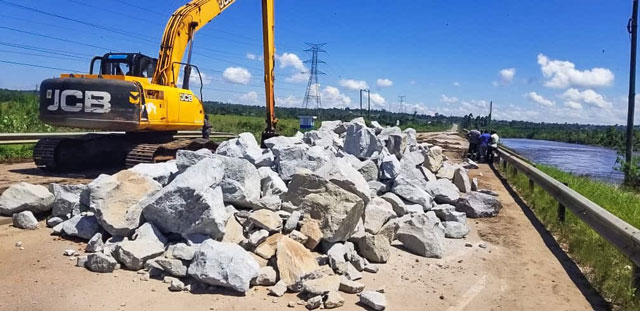
LOP urges UNRA to install emergency bridge on Katonga River
Masaka, Uganda | THE INDEPENDENT | The Uganda National Roads Authority (UNRA) expects to compelete emergency repairs on the River Katonga Bridge along the Kampala-Masaka highway in three weeks.
“We estimate that it will take approximately three weeks to carry out the necessary emergency repairs on Katonga Bridge,” UNRA spokesperson, Allan Ssempebwa said.
The closure of this vital route has disrupted travel to the southwestern part of the country and neighboring borders, including Tanzania, DR Congo, Rwanda, and Burundi.
As an alternative, the government has advised motorists to use the Mpigi-Gomba-Ssembabule route. However, the closure of the bridge has led to increased fares on the alternative route, causing delays and affecting the transportation of goods.
It has also negatively impacted traders who relied on serving travelers along the affected route, such as roadside vendors and small-scale business operators. To address the transportation challenges, the Ministry of Works and Transport has extended the operational jurisdiction of Nation Oil Distributors Limited, known for managing vessels like MV Kalangala and MV NODL for transportation between Entebbe and Kalangala.
They will now provide emergency water transport services directly between Entebbe and Masaka during this period. Hajji Sadala Musoke, the Managing Director of Nation Oil Distributors, confirmed the deployment of MV NODL, a vessel capable of carrying approximately 150 passengers and light cargo. “It will depart from Nakiwogo to Bukakata and return later in the day. However, we anticipate that if traffic increases, we can collaborate with the users of the landing site at Bukakata to develop a schedule that allows MV Nodl to service additional routes,” he explained.
The government will subsidize transportation costs, allowing travelers to pay a reduced fare of 15,000 Shillings. While the water route provides an alternative for passenger transport, some individuals express concerns about the limitations of MV NODL, as it does not accommodate vehicles. Businesswoman Alice Nakamate, a frequent traveler on the Masaka-Kampala route, questions the effectiveness of the water route and highlights the delays and inability to transport vehicles as potential challenges.
“Unless the land route is also affected, the water route is not effective. It involves significant delays, and the inability to transport vehicles poses a problem,” she explained. The transport fares for the available land route between Kampala and Masaka via Mpigi-Gomba-Sembabule range between 25,000 to 30,000 Shillings. As the repairs on Katonga Bridge continue, stakeholders are working to mitigate the impact on transportation and explore feasible alternatives to ensure continued connectivity for travelers in the affected region.
Call for emergency bridge
Mathias Mpuuga, the Leader of the Opposition in Parliament, has called on the Uganda National Roads Authority (UNRA) to urgently install a temporary bridge at Katonga River.
Addressing journalists on Monday during an inspection of the damaged bridge, Mpuuga highlighted the need for immediate action. The floods have not only affected trade and commerce but have also compelled motorists traveling from Kampala to utilize the Mpigi-Butambala-Ssembabule Road, while those from Masaka are relying on the Masaka-Ssembabule Road as an alternative route.
Started off the day doing on spot assessment of the roads in the countryside that were affected most especially by the flooding of River Katonga. Besides the main bridge on the Masaka Highway, the section that connects Gomba to Kalungu district was also washed away by the waters.… pic.twitter.com/fetyVVlMhf
— Mathias Mpuuga (@MathiasMpuuga) May 15, 2023
The extensive catchment area of River Katonga, which includes Mbirizi, Kalisizo, Masaka, Sembabule, Kabamba, and the Katonga Wildlife Reserve, has experienced heavy rainfall, contributing to the occurrence of floods.
Mpuuga dismissed concerns that the bridge’s damage may be attributed to substandard engineering and a compromised use of materials. He emphasized that the focus should be on finding immediate solutions and restoring the vital transportation link.
As the Member of Parliament representing Nyendo – Mukungwe Division in Masaka City, Mpuuga, along with other critics, criticized the government for allowing ongoing sand mining and rice growing activities in Lwera swamp. They believe these activities have contributed to the flash floods while questioning the absence of clear plans to restore the ecosystem.
However, Dr. Barirega Akankwasah, the Executive Director of the National Environment Management Authority (NEMA), argued against this assertion, stating that blaming rice growing and sand mining for the bridge’s collapse is scientifically false and ecologically impossible.
NEMA released a statement noting that the country is currently experiencing enhanced rainfall, with areas around Lake Victoria receiving significant amounts. They attributed the heavy rains to climate change, warning that such effects will persist.
NEMA encouraged the public to take action in reversing the impact of natural disasters by focusing on the restoration and conservation of fragile ecosystems, including forests, wetlands, hilly and mountainous areas, lake shores, and river banks. This holistic approach aims to mitigate the adverse effects of climate change and ensure the long-term sustainability of the environment.
*****
URN
 The Independent Uganda: You get the Truth we Pay the Price
The Independent Uganda: You get the Truth we Pay the Price





